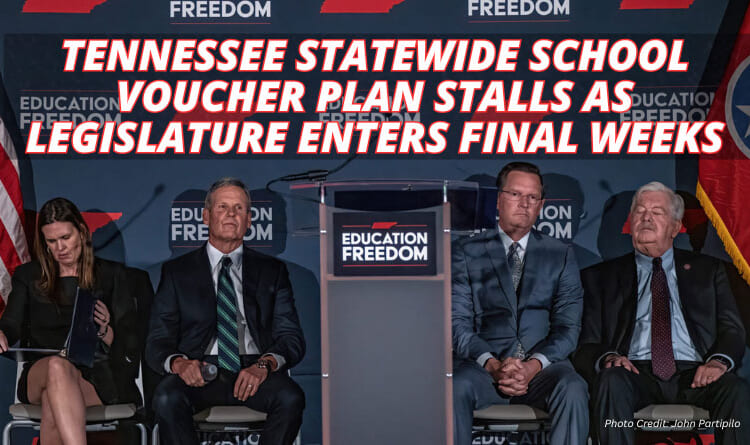This story was originally published by Chalkbeat. Sign up for Chalkbeat Tennessee’s free daily newsletter to keep up with statewide education policy and Memphis-Shelby County Schools.
Photo Credit: John Partipilo
By Marta Aldrich [Chalkbeat Tennessee via The Tennessee Lookout] –
Tennessee Gov. Bill Lee’s push to create a statewide school voucher system is running out of time as Republican lawmakers work to reconcile significantly different proposals and iron out disagreements over student testing requirements.
After sailing through education committees and building early momentum, the bill has stalled for three weeks in finance committees — without public discussion.
GOP leaders hope to complete the 2024 session by April 26. That leaves two weeks to approve a state budget, decide on dozens more bills, and seek consensus on one of the biggest education proposals of Lee’s administration.
Senate Education Committee Chairman Jon Lundberg of Bristol and House K-12 Subcommittee Chairman Kirk Haston of Lobelville have been key players during weeks of private negotiations.
“We’re still working on it,” Lundberg said Thursday as he emerged from the Senate chamber. He declined to take questions from reporters.
Privately, several Republican lawmakers have told Chalkbeat the governor’s statewide voucher plan is sputtering and may not have the votes needed to pass in their respective chambers, especially if negotiators tinker too much with the original proposals.
But publicly, the governor and GOP leadership sound hopeful.
“It feels like they’re close,” Lee told reporters after the legislature recessed for the week. “I’m very encouraged.”
Asked about sticking points, Lt. Gov. Randy McNally said the Senate wants to make sure voucher recipients take some type of annual state-approved test that can be used to compare and rank students in order to gauge the program’s academic effectiveness. The House version has no state testing requirements for students who accept vouchers.
House Speaker Cameron Sexton said his chamber is “adamant” that any school choice-related package includes a provision to reduce student testing in public schools. He also indicated that the State Collaborative on Reforming Education, an education research and advocacy group known as SCORE and founded by former U.S. Sen. Bill Frist, is being consulted as negotiations progress.
“We’ve had a lot of conversations this week,” Sexton said about talks between the House and Senate. “So we’re hopeful we can get there.”
Lee’s Education Freedom Scholarship Act, projected to cost $144 million in its first year, would provide taxpayer funding to up to 20,000 K-12 students to pay toward private school tuition. The governor has set aside that amount for the program in his proposed budget.
The Senate’s version also would allow public school students to enroll in any district, even if they’re not zoned for it, provided there’s enough space and teaching staff.
The House’s larger and more expensive version includes a long list of enticements aimed at public school supporters, including reducing testing time for students, increasing the state’s contribution toward health insurance costs for teachers, requiring fewer evaluations for high-performing teachers, and giving districts extra money to help with their building costs.
Democrats in the legislature oppose school vouchers, even while supporting many of the public school provisions in the House bill.
Caucus Chairman John Ray Clemmons said he’s glad to see the bill’s progress slow, but added that Democrats are staying vigilant as the two-year session moves toward adjournment.
“Deals get cut late at night,” said the Nashville lawmaker.
Meanwhile, lawmakers are anxious to head home during an election year. All 99 seats in the House and half of the Senate’s 33 seats are on the ballot this year. Until the session ends, incumbents can’t begin accepting campaign contributions. And Republican members in both chambers don’t appear interested in taking a stance on the controversial voucher bill during an election year if the measure is unlikely to succeed.
More private talks by Republican leadership are planned for the weekend.
The bill is scheduled to be taken up Monday by the Senate Finance Committee and Tuesday by the House Finance Subcommittee. McNally, the Senate’s leader, said the outcomes there will signal the proposal’s chances.
“One of the keys will be as it moves through the finance committee in both houses,” McNally said. “I think if you see that, you probably know that things are going fairly well.”
You can track the legislation on the General Assembly’s website.













